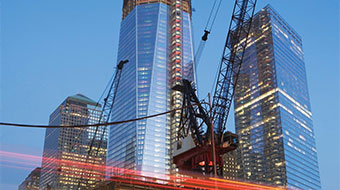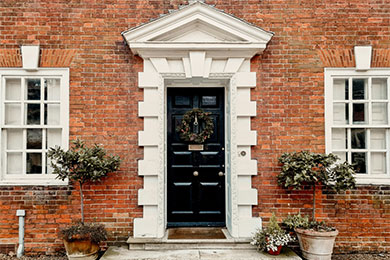6 tips for managing vacant properties

Rhodri Pashley
Property and Casualty Risk Engineering Services Manager, UKI
In many European cities, including London, Stockholm, Berlin and Lyon, the percentage of vacant offices has increased in the past three years.1 When offices or other commercial or industrial buildings become vacant due to renovation work or change in tenants, they are subject to different risks than when they are occupied. This is because vacant buildings lack the day-to-day activity that naturally mitigates common and inherent hazards. Common vulnerabilities include fire, vandalism, burglary and water damage.
It is advisable to think about the potential risks a property might be subject to before it becomes unoccupied and apply a mitigation strategy accordingly, preferably by partnering with an insurer’s risk engineers. In this article, we outline some of the hazards that may occur and the mitigation strategies for real estate companies to consider.
1. Emergency planning for property vacancy
Prior to the shutdown of the building, think about establishing an emergency response plan with the appropriate key holders. We would recommend making the local fire brigade aware that the building will be vacant, and advising the brigade of the current state of the building water supplies, utilities, any unusual hazards, and the ease of access to the site, such as the presence of road barriers or high security fencing.
2. Exterior areas maintenance
Consider keeping the building exteriors clear of excess materials or combustibles which could be susceptible to arson attacks or theft. Vegetation could be trimmed regularly to make it less obvious that the building is vacant. Maintaining the upkeep of windows, doors and roofs can protect against storm damage or water ingress. This is also valuable for security and intrusion protection. If the property was previously tenanted, think about checking its condition and undertake remedial work if required.
3. Interior areas precautions
Consider removing hazardous and combustible materials to reduce internal fire-loading. It may be preferable to remove hazards that could injure people that access the building, for example the emergency services, security staff or trespassers.
4. Building systems maintenance
It is advisable to maintain electricity and gas supplies for alarm and heating purposes but otherwise isolate energy supplies and shut down all nonessential equipment or systems. Keeping the property heated to an adequate level (minimum of 4oC) can prevent the sprinkler pipes from freezing. Regular maintenance, inspection and testing regimes of fire protection systems will help to ensure that systems operate adequately.
5. Security and fire protection measures
Boarding or bricking up windows, doors and other openings can help to secure the building. Think about implementing guarding protocols, such as regular patrols by trained personnel, and an intruder alarm system with rapid response to deter trespassers. Other security measures may include installing high-quality CCTV cameras, bright exterior lighting and perimeter fencing plus roadway barriers. Maintaining the operation of sprinkler and fire detection systems throughout the building will help ensure prompt response to fires.
6. Property inspection regimes
Consider establishing regular inspection regimes (monthly at a minimum) to identify any damage to the exterior or interior of the property or any evidence of attempted unauthorised access. Any identified issues should be promptly addressed.
Summary
As outlined in this article, there are a number of different aspects to think about when preparing buildings for periods of vacancy. With all the considerations outlined in this article, it is recommended that brokers and their clients discuss these in depth with their insurer.
At Chubb, our Real Estate Industry Practice is backed by an enhanced proposition which includes specialist Real Estate underwriters, dedicated account engineers and Real Estate claims specialists, all underpinned by Chubb's global presence and local knowledge. Contact us to discover how our Real Estate insurance solutions can benefit you and your clients’ real estate portfolios and operations.
Insights and expertise

All content in this material is for general information purposes only. It does not constitute personal advice or a recommendation to any individual or business of any product or service. Please refer to the policy documentation issued for full terms and conditions of coverage.
Chubb European Group SE trading as Chubb, Chubb Bermuda International and Combined Insurance, is authorised by the Autorité de contrôle prudentiel et de résolution (ACPR) in France and is regulated by the Central Bank of Ireland for conduct of business rules.
Registered in Ireland No. 904967 at 5 George's Dock, Dublin 1.
Chubb European Group SE is an undertaking governed by the provisions of the French insurance code with registration number 450 327 374 RCS Nanterre and the following registered office: La Tour Carpe Diem, 31 Place des Corolles, Esplanade Nord, 92400 Courbevoie, France. Chubb European Group SE has fully paid share capital of €896,176,662.







